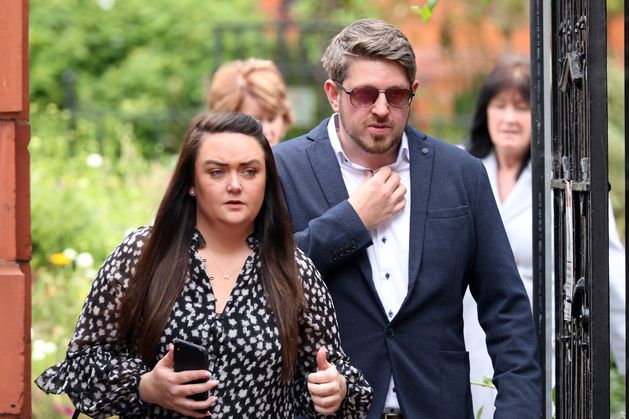World
Baby suffered fatal brain damage during birth after delivery delayed to allow father take a Covid test, inquest hears

Baby Molly Taylor Smith died from hypoxic ischemic encephalopathy – a lack of oxygen or blood to the brain – at the National Maternity Hospital, Holles Street in Dublin on May 19, 2020 – six days after being delivered by emergency caesarean section.
At the outset of the inquest at Dublin District Coroner’s Court today, an apology was read out on behalf of the National Maternity Hospital.
Solicitor, Gemma Coady, of Mason, Hayes & Curran said the hospital acknowledged that there had been “a failure to appreciate changes in Molly’s heart rate tracings” after a decision had been made that she should be delivered by caesarean.
The inquest heard that the delivery of the baby was delayed to allow for the results of a Covid-19 test to become available in order to allow the baby’s father, Keith Smith, to be in theatre for the birth.
A hospital registrar, Adriana Olaru, gave evidence that she decided that the baby should be delivered by C-section at 11pm on May 12, 2020 as the labour was slow and her mother, Joanne, had a fever.
Dr Olaru said readings from the CTG, which measures the foetal heartbeat, at the time were “satisfactory”.
Baby Molly Taylor Smith who died on 19th May 2020 at the National Maternity Hospital, Holles Street. (Picture: Collins Dublin_
The registrar said the decision to wait for around 50 minutes for the results of the Covid-19 test to come back to allow the mother’s partner in the theatre was “reasonable” in the circumstances.
Dr Olaru said the CTG readings at the time that the results of the Covid-19 test became available at 11.55pm had shown “pathological changes”, which led to the baby being delivered by emergency C-section.
She told the inquest that baby Molly was “in poor condition” at the point of delivery.
In reply to questions from the coroner, Clare Keane, the witness said she was satisfied with the CTG readings at 11pm.
“I did not feel Molly was in any particular danger,” said Dr Olaru.
However, she stressed that she would be concerned if there had been any changes in the CTG readings.
In that scenario, Dr Olaru remarked: “We will have to expedite the delivery and we will not wait for the Covid test.”
Dr Olaru said she had not been made aware of any changes in the CTG readings.
She added: “I believe a change in the CTG was noted but it was not communicated to medical staff.”
Dr Olaru said she could not comment on why that information was not passed to doctors.
She explained that she would normally have been around the labour ward where Ms Taylor Smith was, but due to Covid-19 restrictions, medical staff did not stay in the area if not examining patients.
Several midwives who attended Ms Taylor Smith provided written statements to the inquest about the care provided to her.
A consultant obstetrician and gynaecologist, Stephen Carroll, told the inquest that Molly’s mother had an uneventful pregnancy until she was induced in the hospital.
Dr Carroll said the decision for the baby to be delivered by C-section was due to the “poor progress” of labour following induction.
He agreed that CTG readings “did not indicate the foetus was in significant jeopardy at the time”.
The consultant told the coroner that he did not believe OxyContin (a pain relief drug) given to Molly’s mother was responsible for any brain injury suffered by the baby.
A consultant neonatologist, Anna Curley, told the inquest that the baby girl was not breathing at birth, while it was two-and-a-half minutes before her heartbeat was restored.
Dr Curley said her condition rapidly improved after that but a decision was still taken to provide cooling treatment for the baby.
However, the consultant said an MRI scan taken when she was five days old had confirmed that Molly had suffered extensive brain damage.
She said a decision was taken to provide palliative care to the baby girl after she became “critically unwell”.
Molly’s mother, Joanne Taylor Smith, told the inquest that she was admitted to the hospital on May 11, 2020 when six days overdue with her first child.
Fighting back tears, Ms Taylor Smith described how she was “super-excited” at the prospect of meeting her baby as she and her husband had not known the gender.
She recalled how their “strong, brave little girl” was born at 12.17am on May 13, 2020.
Ms Taylor Smith said she was feeling “so happy but confused” after Molly was born before being advised by medical staff that the baby would need to be brought to a neonatal intensive care unit “for a little bit of help”.
She also recounted how they waited to see over the following days whether she would recover from a “horrific” brain injury.
Ms Taylor Smith told the inquest that the couple now visit Molly in her “forever bed”.
“That is how we look after her now,” she added.
She described how she would have loved for her perfectly formed baby girl to have been able to meet her younger sister.
“If she was born a lot sooner, she would be here,” Ms Taylor Smith sobbed.
She also expressed pride in how Molly had helped to save another life as her heart valves had been donated and transplanted to another newborn baby.
The coroner noted that post-mortem results confirmed that Molly was a normally formed and developed baby at birth.
Dr Keane returned a verdict of death by medical misadventure based on the evidence.
Offering her condolences to the baby’s parents, Dr Keane also praised them on their decision to donate Molly’s heart valves in what she claimed was “an incredibly generous gesture at such a difficult time”.
Following the inquest, the couple, who come from Sandyford, Dublin, hugged medical staff from the National Maternity Hospital.










